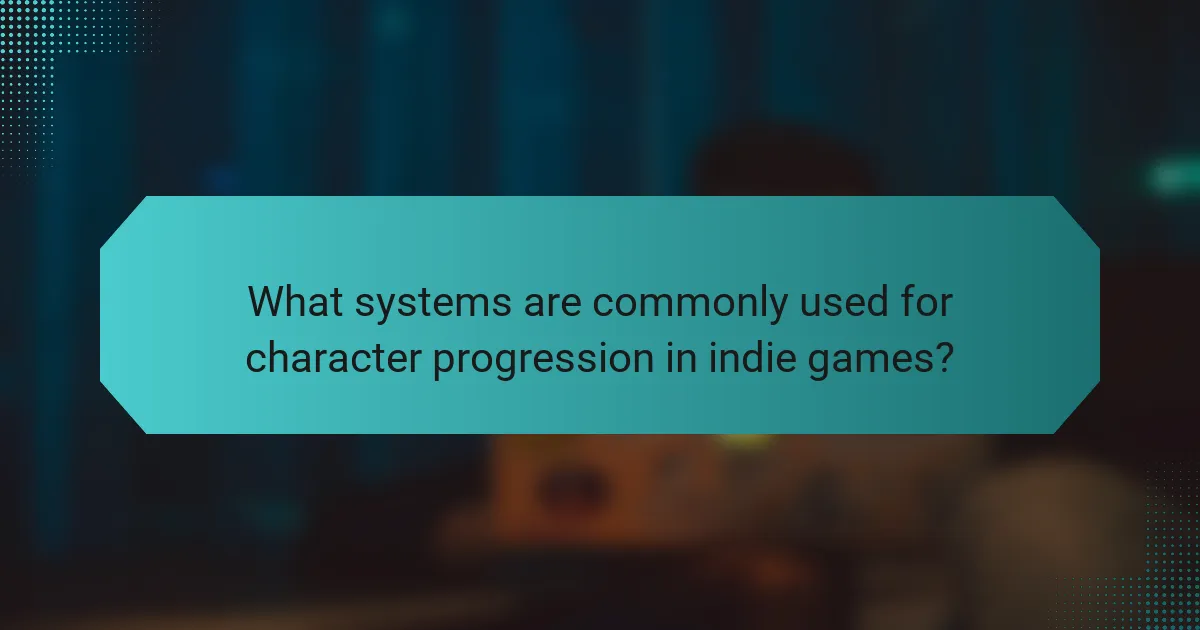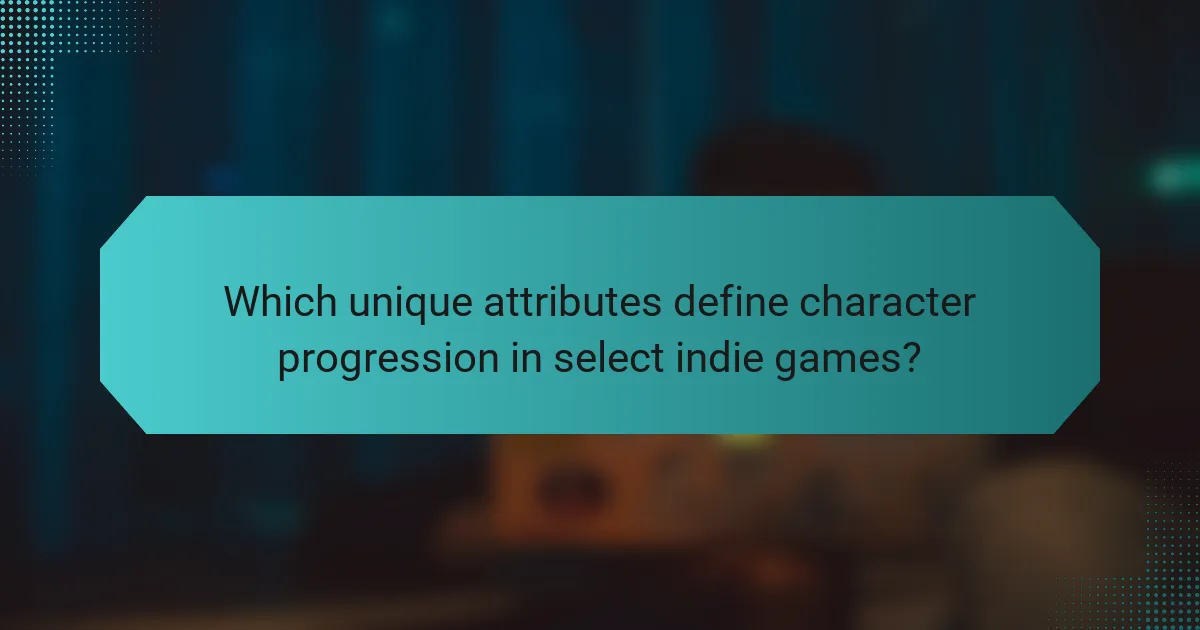Character progression in indie fantasy adventure games enhances player engagement and satisfaction. This article explores methods like skill trees, experience points, and narrative choices. It examines how these systems impact gameplay dynamics and player investment. Additionally, it highlights unique and rare attributes that contribute to immersive experiences.

What are the key methods of character progression in indie fantasy adventure games?
Character progression in indie fantasy adventure games typically involves skill trees, experience points, and narrative choices. Skill trees allow players to customise abilities, while experience points reward gameplay and enhance character attributes. Narrative choices impact character development, influencing story outcomes and relationships with other characters. These methods create a dynamic progression system that enhances player engagement and immersion.
How do experience points influence character development?
Experience points significantly influence character development by determining progression speed and unlocking abilities. In indie fantasy adventure games, players accumulate experience points through various activities, such as defeating enemies or completing quests. This accumulation leads to level-ups, enhancing attributes like strength and intelligence. As characters progress, unique skills and rare abilities become available, allowing for diverse playstyles. The design of experience systems can shape player engagement and strategy, emphasising the importance of experience points in character growth.
What role do skill trees play in progression systems?
Skill trees provide a structured way for players to customise character abilities and enhance progression. They allow players to choose specific paths, influencing gameplay and strategy. This customisation fosters deeper engagement and investment in character development. Players often experience a sense of accomplishment as they unlock unique skills, which can impact overall game dynamics. Additionally, skill trees can introduce rare abilities that provide distinct advantages, making each playthrough unique.
How do narrative choices affect character growth?
Narrative choices significantly influence character growth by shaping player decisions and emotional connections. In indie fantasy adventure games, these choices often determine character arcs and development paths. For instance, branching storylines can lead to unique growth experiences, allowing players to explore different aspects of a character’s personality. Additionally, moral dilemmas presented in narratives can challenge players, fostering deeper engagement and personal investment in character outcomes. This dynamic interplay between narrative and character progression enhances overall gameplay and storytelling impact.
Which gameplay mechanics support character advancement?
Gameplay mechanics that support character advancement include experience points, skill trees, and equipment upgrades. These systems create a sense of progression and enhance player engagement. Experience points reward players for completing tasks, while skill trees offer choices that shape character abilities. Equipment upgrades improve performance, allowing for unique playstyles. Together, these mechanics foster a rewarding experience in indie fantasy adventure games.

What systems are commonly used for character progression in indie games?
Character progression in indie fantasy adventure games commonly utilises experience points, skill trees, and inventory systems. These methods enhance player engagement and influence gameplay dynamics. Experience points allow players to level up, unlocking new abilities. Skill trees provide choices for character specialisation, fostering unique play styles. Inventory systems enable resource management, impacting character growth and strategy. Each system contributes to a rich, immersive experience, encouraging exploration and experimentation.
How do leveling systems differ across various indie titles?
Leveling systems in indie fantasy adventure games vary significantly based on design goals and player engagement strategies. Some titles implement traditional experience points, while others favour skill trees or narrative-driven progression.
For example, “Hollow Knight” uses a skill-based system, rewarding players with abilities that enhance exploration. Conversely, “Stardew Valley” employs a more casual leveling approach, where skills improve through repeated actions.
These differences impact gameplay by shaping player choices and experiences. Players in skill-based systems often focus on mastering abilities, while those in narrative-driven games may prioritise story progression over character stats.
Overall, the diversity in leveling systems enriches the indie gaming landscape, offering unique experiences tailored to various player preferences.
What are the benefits of class-based progression systems?
Class-based progression systems enhance gameplay by providing distinct character roles, fostering strategic diversity, and encouraging player investment. These systems promote unique attributes such as specialised skills and abilities, which can lead to varied gameplay experiences. Players often feel a deeper connection to their characters as they develop unique traits over time. Furthermore, class-based systems can create a sense of community as players collaborate to leverage their characters’ strengths, enriching the overall gaming experience.
How do open-world mechanics impact character progression?
Open-world mechanics enhance character progression by providing players with the freedom to explore and engage in diverse activities. This design fosters organic growth through quests, skill acquisition, and resource gathering. Players can choose their paths, impacting their character’s development based on personal playstyle. As a result, character progression feels more personalised and immersive.

What impact does character progression have on gameplay experience?
Character progression significantly enhances gameplay experience by providing players with a sense of achievement and growth. Players feel more invested in their characters as they unlock new abilities and skills. This progression encourages exploration and experimentation within the game world. Additionally, diverse progression systems, such as skill trees or leveling up, can cater to different play styles, making gameplay more engaging. Ultimately, character progression shapes player satisfaction and retention in indie fantasy adventure games.
How does progression influence player engagement and retention?
Character progression significantly enhances player engagement and retention by providing a sense of accomplishment and growth. Players feel invested in their characters as they unlock abilities and gear, fostering emotional connections. This method of progression often leads to increased playtime, as players seek to explore all available upgrades. Systems that offer varied progression paths, such as skill trees or customisable builds, cater to diverse playstyles, further enhancing player satisfaction. As a result, games that effectively implement character progression tend to see higher retention rates.
What are the psychological effects of character growth on players?
Character growth in indie fantasy adventure games positively impacts players by enhancing emotional engagement and motivation. As players witness their characters evolve, they often experience a sense of achievement and personal investment in the story. This progression fosters a deeper connection to the game world, encouraging exploration and experimentation with different gameplay mechanics. Furthermore, character growth can lead to increased self-efficacy, as players feel empowered by overcoming challenges and achieving goals. Overall, the psychological effects of character progression contribute to a richer gaming experience, promoting both enjoyment and personal development.
How does character progression affect game difficulty and balance?
Character progression significantly enhances game difficulty and balance by adjusting player capabilities and enemy challenges. As players advance, they unlock new skills and abilities, which can make encounters easier or harder depending on game design.
Effective character progression systems maintain a balance between player growth and challenge. For instance, scaling enemy strength with player level ensures that the gameplay remains engaging. Additionally, unique attributes, like skill trees or equipment upgrades, can introduce variability in how players approach challenges, further influencing difficulty.
Indie fantasy adventure games often utilise diverse progression methods, such as experience points or crafting systems, to shape player experiences. These methods can create a sense of achievement while also ensuring that players face appropriately scaled challenges, enhancing overall game balance.
In summary, character progression is crucial for maintaining engaging gameplay, as it directly affects the difficulty and balance within indie fantasy adventure games.

Which unique attributes define character progression in select indie games?
Unique attributes defining character progression in indie fantasy adventure games include diverse skill trees, narrative-driven choices, and customisable abilities. These features enhance player engagement and impact gameplay dynamics. For instance, skill trees allow players to specialise their characters, while narrative choices can lead to different story outcomes, influencing character development. Customisable abilities provide a unique playstyle, catering to individual preferences and strategies.
What innovative systems have emerged in recent indie titles?
Innovative systems in recent indie titles focus on dynamic character progression, integrating player choices and narrative impact. Titles like “Hollow Knight” and “Disco Elysium” showcase unique methods, such as skill trees influenced by story decisions. These systems enhance player engagement and emotional investment. Additionally, games like “Hades” employ roguelike elements, allowing for flexible character development through repeated play, which alters abilities and strategies. Such innovations redefine traditional progression, emphasising personal player experiences over linear advancement.
How do cultural narratives shape character progression methods?
Cultural narratives significantly influence character progression methods in indie fantasy adventure games. These narratives shape player expectations and emotional engagement, guiding how characters evolve within the story.
For instance, a game that draws from hero’s journey archetypes often features linear progression, where characters gain abilities and strengths in a predictable manner. In contrast, games inspired by folklore may incorporate nonlinear progression, allowing players to explore diverse paths and choices that affect character development.
Additionally, cultural themes such as redemption or sacrifice can dictate character arcs, impacting the systems used for progression. Games that emphasise community or collaboration may implement systems where character growth is tied to group achievements rather than individual milestones.
Overall, the interplay between cultural narratives and character progression methods creates unique gaming experiences, enhancing player immersion and satisfaction.

What rare attributes can enhance character progression experiences?
Rare attributes that enhance character progression experiences include unique skill trees, dynamic relationships with NPCs, environmental adaptability, and personalised narrative choices. These features create depth and immersion, allowing players to influence the game world meaningfully. Unique skill trees offer specialised abilities that cater to individual playstyles. Dynamic relationships with NPCs can lead to varied story outcomes, enhancing replayability. Environmental adaptability challenges players to strategise based on surroundings, while personalised narrative choices shape the character’s journey, making each experience distinct.
How do community-driven progression systems function?
Community-driven progression systems rely on player collaboration and feedback to enhance character development. These systems often include shared goals, where players contribute to a collective objective, unlocking new content and abilities through teamwork. Players may influence progression by participating in events or challenges, fostering a sense of community. This approach emphasises unique player contributions, enhancing engagement and investment in the game’s narrative and mechanics. As a result, character progression becomes a dynamic and evolving experience, reflecting the community’s collective achievements.
What are the effects of permadeath on character development?
Permadeath significantly impacts character development by forcing players to adapt and evolve their strategies. In indie fantasy adventure games, this mechanic enhances emotional investment and encourages players to consider each decision carefully. Characters may develop unique traits or skills based on their experiences, leading to diverse gameplay outcomes. As a result, permadeath fosters a deeper connection between players and their characters, making victories feel more rewarding and losses more poignant.
How do seasonal events influence character progression?
Seasonal events significantly enhance character progression by introducing unique challenges and rewards. These events often feature limited-time quests that provide exclusive items, experience boosts, or skill enhancements. Players can level up faster by participating in seasonal activities, which may also encourage collaboration with others in multiplayer settings. Additionally, seasonal themes can influence character abilities, offering new gameplay mechanics that diversify player strategies. This dynamic engagement fosters a sense of community and keeps the gameplay experience fresh and exciting.
What best practices can enhance character progression in indie games?
Implementing character progression systems in indie fantasy adventure games enhances player engagement and satisfaction. Key practices include offering meaningful choices, integrating skill trees, and utilising narrative-driven growth.
1. Meaningful Choices: Provide players with impactful decisions that shape their character’s abilities and story arc. This fosters a sense of ownership and personal investment.
2. Skill Trees: Design comprehensive skill trees that allow players to customise their character’s progression. This encourages experimentation and replayability, as players can explore different builds.
3. Narrative Integration: Tie character progression to the game’s narrative. Reward players with story advancements or character development that reflects their choices, enhancing immersion.
4. Feedback Systems: Implement clear feedback mechanisms to inform players of their progress and achievements. This can include visual indicators or in-game achievements that celebrate milestones.
5. Balance and Challenge: Ensure that progression feels rewarding without being overly easy. Introduce challenges that require players to adapt their strategies and skills, maintaining engagement throughout the game.